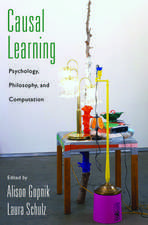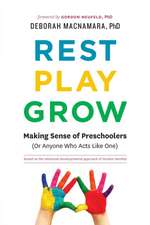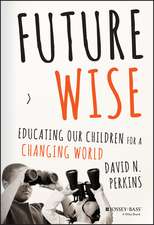The Gardener and the Carpenter
Autor Alison Gopniken Limba Engleză Paperback – aug 2017
Caring deeply about our children is part of what makes us human. Yet the thing we call "parenting" is a surprisingly new invention. In the past thirty years, the concept of parenting and the multibillion-dollar industry surrounding it have transformed child care into obsessive, controlling, and goal-oriented labor intended to create a particular kind of child and therefore a particular kind of adult.
In The Gardener and the Carpenter, the pioneering developmental psychologist and philosopher Alison Gopnik argues that the familiar twenty-first-century picture of parents and children is profoundly wrong-it's not just based on bad science, it's bad for kids and parents, too.
Drawing on the study of human evolution and her own cutting-edge scientific research into how children learn, Gopnik shows that although caring for children is profoundly important, it is not a matter of shaping them to turn out a particular way. Children are designed to be messy and unpredictable, playful and imaginative-and to be very different both from their parents and from each other.
| Toate formatele și edițiile | Preț | Express |
|---|---|---|
| Paperback (2) | 58.35 lei 23-34 zile | +20.79 lei 6-10 zile |
| Random House – 24 aug 2017 | 58.35 lei 23-34 zile | +20.79 lei 6-10 zile |
| Pan Macmillan – aug 2017 | 103.53 lei 3-5 săpt. | +21.26 lei 6-10 zile |
Preț: 103.53 lei
Nou
Puncte Express: 155
Preț estimativ în valută:
19.81€ • 20.47$ • 16.48£
19.81€ • 20.47$ • 16.48£
Carte disponibilă
Livrare economică 26 februarie-12 martie
Livrare express 11-15 februarie pentru 31.25 lei
Preluare comenzi: 021 569.72.76
Specificații
ISBN-13: 9781250132253
ISBN-10: 1250132258
Pagini: 320
Dimensiuni: 136 x 211 x 25 mm
Greutate: 0.3 kg
Editura: Pan Macmillan
ISBN-10: 1250132258
Pagini: 320
Dimensiuni: 136 x 211 x 25 mm
Greutate: 0.3 kg
Editura: Pan Macmillan
Cuprins
CONTENTS
Introduction: The Parent Paradoxes
From Parenting to Being a Parent
The Paradoxes
The Paradoxes of Love
The Paradoxes of Learning
The Uniqueness of Childhood
The Child Garden
1. Against Parenting
In Praise of Mess
The Ideas That Die in Our Stead
Exploring vs. Exploiting
Protective Parents
2. The Evolution of Childhood
Two Pictures
Beyond Just-So Stories
The Paradox of Immaturity
Learning, Culture, and Feedback Loops
Variability: The Unknown Unknowns
Back to Parenting
3. The Evolution of Love
Pair-Bonding: It¿s Complicated
Varieties of Love
Grandmothers
Alloparents
The Commitment Puzzle
The Roots of Commitment
The Costs of Commitment
Love and Parenting
4. Learning Through Looking
The Little Actors
The Myth of Mirror Neurons
The Birth of Imitation
Learning About the World
When Children Are Better Than Adults
Overimitation
Rituals
Imitation Across Cultures
Doing Things Together
5. Learning Through Listening
Learning from Testimony
Being Sure of Yourself
Who You Gonna Believe?
Telling Stories
Questions and Explanations
Why Ask Why?
The Essential Question
Letting the Dude Figure It Out
6. The Work of Play
Rough-and-Tumble Rats
Getting Into Everything
Pop-Beads and Popper
Making Believe
Bayesian Babies
Kinds of Minds
Dancing Robots
Beyond Miss Havisham
7. Growing Up
Apprenticeship
Scholastic Skills
Thinking Differently
Attention Deficit Disorder
Schooling and Learning
The People in the Playground
The Two Systems of Adolescence
8. The Future and the Past: Children and Technology
The Reading Brain
The World of Screens
Eden and Mad Max
The Technological Ratchet
The City of the Web
What to Do?
9. The Value of Children
Private Ties and Public Policy
Finding the Money
The Old and the Young
Work, Play, Art, Science
Conclusion
Notes
Bibliography
Acknowledgments
Index
Introduction: The Parent Paradoxes
From Parenting to Being a Parent
The Paradoxes
The Paradoxes of Love
The Paradoxes of Learning
The Uniqueness of Childhood
The Child Garden
1. Against Parenting
In Praise of Mess
The Ideas That Die in Our Stead
Exploring vs. Exploiting
Protective Parents
2. The Evolution of Childhood
Two Pictures
Beyond Just-So Stories
The Paradox of Immaturity
Learning, Culture, and Feedback Loops
Variability: The Unknown Unknowns
Back to Parenting
3. The Evolution of Love
Pair-Bonding: It¿s Complicated
Varieties of Love
Grandmothers
Alloparents
The Commitment Puzzle
The Roots of Commitment
The Costs of Commitment
Love and Parenting
4. Learning Through Looking
The Little Actors
The Myth of Mirror Neurons
The Birth of Imitation
Learning About the World
When Children Are Better Than Adults
Overimitation
Rituals
Imitation Across Cultures
Doing Things Together
5. Learning Through Listening
Learning from Testimony
Being Sure of Yourself
Who You Gonna Believe?
Telling Stories
Questions and Explanations
Why Ask Why?
The Essential Question
Letting the Dude Figure It Out
6. The Work of Play
Rough-and-Tumble Rats
Getting Into Everything
Pop-Beads and Popper
Making Believe
Bayesian Babies
Kinds of Minds
Dancing Robots
Beyond Miss Havisham
7. Growing Up
Apprenticeship
Scholastic Skills
Thinking Differently
Attention Deficit Disorder
Schooling and Learning
The People in the Playground
The Two Systems of Adolescence
8. The Future and the Past: Children and Technology
The Reading Brain
The World of Screens
Eden and Mad Max
The Technological Ratchet
The City of the Web
What to Do?
9. The Value of Children
Private Ties and Public Policy
Finding the Money
The Old and the Young
Work, Play, Art, Science
Conclusion
Notes
Bibliography
Acknowledgments
Index
Descriere
Descriere de la o altă ediție sau format:
Caring deeply about our children is part of what makes us human. Drawing on the study of human evolution and the authorA's own scientific research into how children learn, the author shows that although caring for children is profoundly important, it is not a matter of shaping them to turn out a particular way.
Caring deeply about our children is part of what makes us human. Drawing on the study of human evolution and the authorA's own scientific research into how children learn, the author shows that although caring for children is profoundly important, it is not a matter of shaping them to turn out a particular way.




















